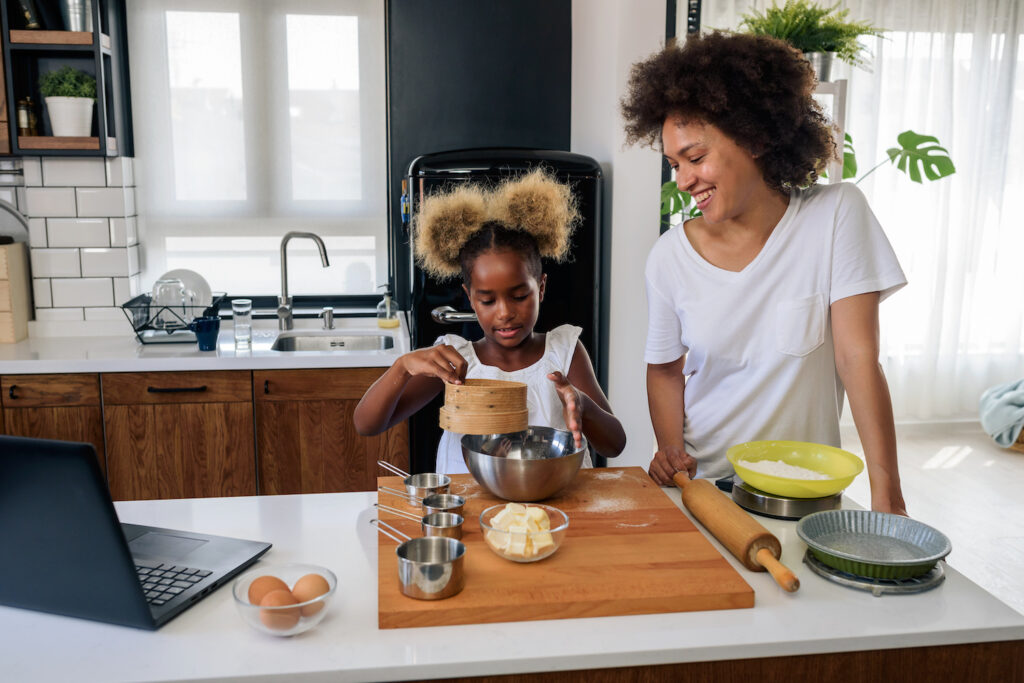10 Ways to Encourage Dinner Table Conversation With Kids
September 29, 2022

As kids get older, they may be less likely to share what they’re thinking about or how they’re feeling. So how do you make sure you keep those lines of communication open? Eating meals together as a family is one routine where conversation can be encouraged, so that your children know that you’re interested in hearing what they have to say. Each meal is an opportunity to reconnect and learn about each other’s lives. Below are some simple tips to help make sure constructive and fun conversations happen at your dinner table.
- Know your child’s schedule so you can ask about specifics. Asking your children about their day is a great conversation starter. If you know their schedule, you can ask them specifics and draw them out from behind their cell phone or tablet to engage with the family. Knowing their schedule like the back of your hand shows your kid how truly invested you are in their learnings and interactions.
- Ask them their rose, bud & thorn of the day. A mindful way to reflect, this creative approach helps your child to analyze their day and categorize their experiences, which helps you to understand their changing perspectives. Ask for their rose, bud, and thorn of the day – Something positive that happened, a challenge they experienced or something they can use more support with, and a new idea that has blossomed or something they are looking forward to.
- Put funny/silly/inquisitive questions in a jar and take turns asking them. Questions like “If your stuffed animals could talk, what would they say?” or, “If you had to give everyone in the family new names, what would they be?”, or “If you could do anything right now, what would you do?”. You’ll see their wheels start to turn and their creativity spark. Plus, finding random tangents that your kids are excited to discuss can sometimes lead to the best conversation.
- Take an interest in their favorite things and ask them about them. Whether it’s a new book, a TV show, or even music, understanding what your child enjoys, and understanding how they interact and perceive these different topics and mediums is great for their self esteem.
- Tell funny stories from your childhood. Kids love when parents are able to actively listen and relate to them on a similar level. Whether their experience was positive or negative, share a similar experience from your childhood, which communicates to your child that you are listening and that they are not alone.
- Don’t interrupt when they are sharing a story. It can be difficult to stop yourself from interjecting into the conversation when you think you know what your child will say, but try to resist that urge. Letting your child finish their thought shows that you’re interested in what they have to say, making them more likely to share more details.
- Ask about their friends. No matter how old your child is, they have a friend that they relate to and enjoy spending time with. Take the time to ask about their friends, and what they enjoy talking about or doing together. Knowing more about who your child spends time with and who they are influenced by is important for their development.
- Be a good example of active listening. I’m sure there are moments where your child acts bored when you or their sibling is talking about a topic that doesn’t interest them, yet they expect all ears when it’s their turn to talk. By practicing active listening with your child, you’re paying attention to what they have to say, and asking questions in real time, as well as helping your child work on their conversational skills.
- It’s not just about the dinner table – great conversations can happen anywhere. In the car, on a walk, or taking part in an activity that your child loves. Sparking an engaging conversation with your young one sets a great example for them on how to converse, interact, and share opinions, which are incremental to their growing brains and feeling comfortable expressing and sharing their thoughts.
- Practice engaging conversation. Having conversation should be a back and forth exchange between you and your child, not a monologue or a lecture. It may take time to get your child to a place where they are comfortable talking about things, or getting them to think in a way where they have to form opinions and evaluate their interests. Whatever the case may be, talking with your child should be enjoyable for you and them.

 BACK
BACK